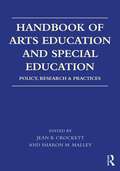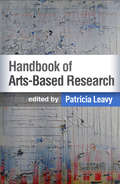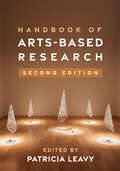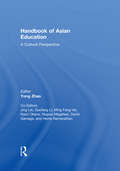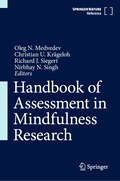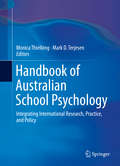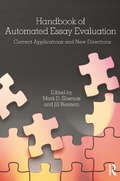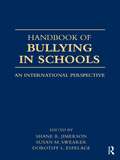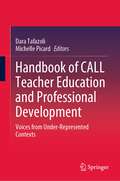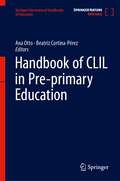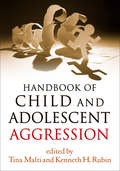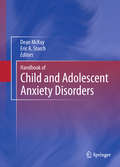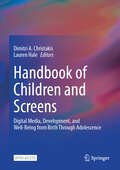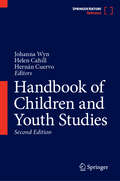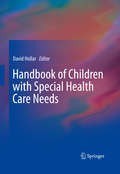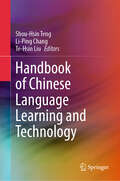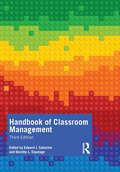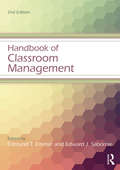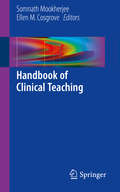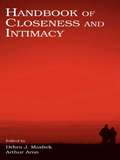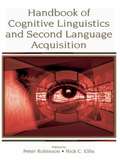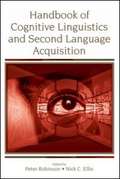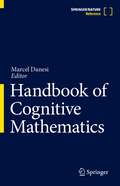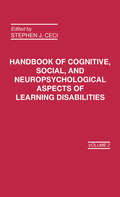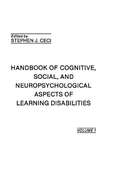- Table View
- List View
Handbook of Arts Education and Special Education: Policy, Research, and Practices
by Jean B. Crockett Sharon M. MalleyThe Handbook of Arts Education and Special Education brings together, for the first time in a single reference volume, policy, research, and practices in special education and arts education synthesized to inform stakeholders across a broad spectrum of education. This handbook encompasses arts education for students with disabilities, from pre-K through transition to postsecondary education and careers as well as community arts education, with particular attention to conceptual foundations; research-based practices; professional standards; students’ cognitive, artistic, and social growth; career education; and future directions for research and practice in special education and arts education.
Handbook of Arts-Based Research
by Patricia LeavyBringing together interdisciplinary leaders in methodology and arts-based research (ABR), this comprehensive handbook explores the synergies between artistic and research practices and addresses issues in designing, implementing, evaluating, and publishing ABR studies. Coverage includes the full range of ABR genres, including those based in literature (such as narrative and poetic inquiry); performance (music, dance, playbuilding); visual arts (drawing and painting, collage, installation art, comics); and audiovisual and multimethod approaches. Each genre is described in detail and brought to life with robust research examples. Team approaches, ethics, and public scholarship are discussed, as are innovative ways that ABR is used within creative arts therapies, psychology, education, sociology, health sciences, business, and other disciplines. The companion website includes selected figures from the book in full color, additional online-only figures, and links to online videos of performance pieces. See also Dr. Leavy's authored book, Method Meets Art, Second Edition, an ideal course text that provides an accessible introduction to ABR.
Handbook of Arts-Based Research
by Patricia LeavyThe first methods handbook devoted solely to arts-based research (ABR) is now in a thoroughly updated second edition, featuring a new section on global perspectives plus new chapters on critical approaches and documentary film. The volume explores the synergies between contemporary artistic and research practices and addresses issues in designing, implementing, evaluating, and publishing ABR studies. Chapters are written by leading practitioners of each ABR genre, including those based in literature (such as narrative inquiry, fiction, and poetry); performance (music, dance, ethnodrama); visual arts (drawing, painting, collage, installation art, comics); and audiovisual and multimethod approaches. Team approaches, ethics, social justice concerns, and public scholarship are discussed, as are innovative ways that ABR is used within creative arts therapies, psychology, education, sociology, health sciences, and other disciplines. The companion website includes selected figures from the book in full color, additional online-only figures, and links to online videos of performance pieces. New to This Edition Updated throughout with current research, theory, and ABR examples. Chapters on critical approaches to ABR and on documentary film. Chapters on ABR projects in Taiwan, Japan, and the United Kingdom.
Handbook of Asian Education: A Cultural Perspective
by Yong ZhaoComprehensive and authoritative, this Handbook provides a nuanced description and analysis of educational systems, practices, and policies in Asian countries and explains and interprets these practices from cultural, social, historical, and economic perspectives. Using a culture-based framework, the volume is organized in five sections, each devoted to educational practices in one civilization in Asia: Sinic, Japanese, Islamic, Buddhist, and Hindu. Culture and culture identities essentially are civilization identities; the major differences among civilizations are rooted in their different cultures. This framework offers a novel approach to capturing the essence of the diverse educational systems and practices in Asia. Uniquely combining description and interpretation of educational practices in Asia, this Handbook is a must-have resource for education researchers and graduate students in international and comparative education, globalization and education, multicultural education, sociocultural foundations of education, and Asian studies, and for educational administrators and education policy makers.
Handbook of Assessment in Mindfulness Research
by Nirbhay N. Singh Richard J. Siegert Christian U. Krägeloh Oleg N. MedvedevThis handbook provides comprehensive coverage of assessment instruments used in mindfulness research. It discusses traditional and modern approaches used to develop psychometric measures and to establish their reliability and validity, such as classical test theory, item response theory and Rasch model, generalizability theory, facet benchmarking, and network analysis. The handbook provides information on conceptual foundations, development, and psychometric properties of assessment instruments used to measure mindfulness in children, adolescents, and adults. In addition, it provides similar information on scales used in specific contexts and for various purposes. It reviews behavioral, cognitive, and psychophysiological assessment measures of mindfulness. The handbook examines a broad range of psychological, physical health, and mental health, and related measures that are used in mindfulness research. This reference work enables researchers to choose appropriate measurement tools fora broad range of mindfulness research.Key areas of coverage include:Nature and theoretical foundations of assessment.Origins and definitions of mindfulness.Mindfulness scales for children and adolescents.Mindfulness scales for adults.Mindfulness scales for specific contexts and purposes.Mindfulness and Buddhist-related scales.Behavioral assessments of mindfulness.Cognitive and psychophysiological assessments of mindfulness. The Handbook of Assessment in Mindfulness Research is an essential reference for researchers, professors, and graduate students as well as clinicians, therapists, and other mental health practitioners in clinical psychology and affiliated medical and mental health disciplines, including complementary and alternative medicine, social work, occupational and rehabilitation therapy.
Handbook of Australian School Psychology
by Monica Thielking Mark D. TerjesenThis handbook addresses the current state and practice of school psychology with a focus on standards unique to Australia, including historical, legal, ethical, practical, and training factors. It provides a compilation of the most current research-based practices as well as guidelines for evidence-based assessment and intervention for common conditions (e. g. , autism, depression, learning disabilities) and for delivering appropriate services to targeted student populations (e. g. , LGBT, gifted, medical issues). Chapters discuss the application of national and international school psychology practices within the Australian educational and psychological structure. The handbook also examines the lack of formal resources specific to Australia's culture and psychology systems, with its unique mix of metropolitan cities and the vast geographic landscape that spans regional and remote areas. It offers numerous case studies and innovative school mental health programs as well as recommendations for professional development and advocacy that are unique to Australian school psychology. Topics featured in this Handbook include: Evidence-based assessment and intervention for dyscalculia and mathematical disabilities. Identification and management of adolescent risk-taking behaviors and addictions. Understanding and responding to crisis and trauma in the school setting. Prevention and intervention for bullying in schools. Class and school-wide approaches to addressing behavioral and academic needs. The role of school psychologists in the digital age. Practical advice for school psychologists facing complex ethical dilemmas. The Handbook of Australian School Psychology is a must-have resource for researchers, scientist-practitioners, and graduate students in child and school psychology, social work, and related fields that address mental health services for children and adolescents.
Handbook of Automated Essay Evaluation: Current Applications and New Directions
by Mark D. Shermis Jill BursteinThis comprehensive, interdisciplinary handbook reviews the latest methods and technologies used in automated essay evaluation (AEE) methods and technologies. Highlights include the latest in the evaluation of performance-based writing assessments and recent advances in the teaching of writing, language testing, cognitive psychology, and computational linguistics. This greatly expanded follow-up to Automated Essay Scoring reflects the numerous advances that have taken place in the field since 2003 including automated essay scoring and diagnostic feedback. Each chapter features a common structure including an introduction and a conclusion. Ideas for diagnostic and evaluative feedback are sprinkled throughout the book. Highlights of the book’s coverage include: The latest research on automated essay evaluation. Descriptions of the major scoring engines including the E-rater®, the Intelligent Essay Assessor, the Intellimetric™ Engine, c-rater™, and LightSIDE. Applications of the uses of the technology including a large scale system used in West Virginia. A systematic framework for evaluating research and technological results. Descriptions of AEE methods that can be replicated for languages other than English as seen in the example from China. Chapters from key researchers in the field. The book opens with an introduction to AEEs and a review of the "best practices" of teaching writing along with tips on the use of automated analysis in the classroom. Next the book highlights the capabilities and applications of several scoring engines including the E-rater®, the Intelligent Essay Assessor, the Intellimetric™ engine, c-rater™, and LightSIDE. Here readers will find an actual application of the use of an AEE in West Virginia, psychometric issues related to AEEs such as validity, reliability, and scaling, and the use of automated scoring to detect reader drift, grammatical errors, discourse coherence quality, and the impact of human rating on AEEs. A review of the cognitive foundations underlying methods used in AEE is also provided. The book concludes with a comparison of the various AEE systems and speculation about the future of the field in light of current educational policy. Ideal for educators, professionals, curriculum specialists, and administrators responsible for developing writing programs or distance learning curricula, those who teach using AEE technologies, policy makers, and researchers in education, writing, psychometrics, cognitive psychology, and computational linguistics, this book also serves as a reference for graduate courses on automated essay evaluation taught in education, computer science, language, linguistics, and cognitive psychology.
Handbook of Bullying in Schools: An International Perspective
by Shane R. Jimerson Dorothy L. Espelage Susan M. SwearerThe Handbook of Bullying in Schools provides a comprehensive review and analysis of what is known about the worldwide bullying phenomena. It is the first volume to systematically review and integrate what is known about how cultural and regional issues affect bullying behaviour and its prevention. Key features include the following: Comprehensive – forty-one chapters bring together conceptual, methodological, and preventive findings from this loosely coupled field of study, thereby providing a long-needed centerpiece around which the field can continue to grow in an organized and interdisciplinary manner. International Focus – approximately forty-percent of the chapters deal with bullying assessment, prevention, and intervention efforts outside the USA. Chapter Structure – to provide continuity, chapter authors follow a common chapter structure: overview, conceptual foundations, specific issues or programs, and a review of current research and future research needs. Implications for Practice – a critical component of each chapter is a summary table outlining practical applications of the foregoing research. Expertise – the editors and contributors include leading researchers, teachers, and authors in the bullying field, most of whom are deeply connected to organizations studying bullying around the world.
Handbook of CALL Teacher Education and Professional Development: Voices from Under-Represented Contexts
by Michelle Picard Dara TafazoliThis comprehensive handbook provides an overview of current trends in computer-assisted language learning (CALL) teacher education and professional development across the globe. It highlights theories and practices in CALL teacher education and professional development in five sections, such as English language teaching, including pre-service teachers, in-service teachers, teacher educators, material developers, course designers and researchers. It explores the role of CALL teacher education and professional development in many underexplored countries such as Africa, Asia, Eastern Europe and the Middle East. It stresses the critical role of professional development programs, from the use of technology in its generic sense. The theoretical and empirical chapters in the book provide a more inclusive and comprehensive picture of various aspects of CALL teacher education and professional development globally. It offers context-specific approaches and strategies to language teachers and teacher educators. It provides pedagogical implications and suggestions for promoting digital literacy and autonomy in online education. This book provides valuable insights for researchers, teacher educators and teacher trainers in applied linguistics.
Handbook of CLIL in Pre-primary Education (Springer International Handbooks of Education)
by Ana Otto Beatriz Cortina-PérezThis book provides an in-depth look on Content and Language Integrated Learning (CLIL) and Early Childhood Education (ECE), two domains where major joint research is needed. By taking stock on theoretical underpinnings, it explores the ideal conditions for early additional language acquisition in preschool contexts through CLIL with a learner-centered approach grounded in developmentally appropriate practices (DEP) and an emphasis on the importance of play, cognition, holistic content adaptation and social-emotional learning. The book also offers a comprehensive view of how this methodological approach has already set a clear path on Pre-primary education internationally. Finally, it offers insights into CLIL pedagogies as related and adapted to Pre-primary education, resources and materials for very young learners and practical implementation from the classroom. By providing a solid empirical background on Pre-primary CLIL, along with appropriate methodological issues and practices, this book serves as a key resource to students, practitioners, academics as well as teacher educators and policy-makers in international contexts.
Handbook of Child and Adolescent Aggression
by Tina Malti Kenneth H. Rubin Tracy VaillancourtPresenting cutting-edge work from leading scholars, this authoritative handbook reviews the breadth of current knowledge on aggression from infancy through adolescence. The volume explores the forms and functions of aggression and the multiple factors that contribute to its emergence, development, and consequences, including genetic and biological influences, temperament, family dynamics, peer relations, and social inequality. It provides up-to-date perspectives on problems such as disruptive and defiant behaviors, bullying (including cyberbullying), social aggression, and youth violence, and examines relations between aggression and normative social–emotional and social-cognitive development. It also discusses the opposite end of the spectrum, including kindness and prosocial behaviors. Identifying important implications for practice and policy, contributors describe effective approaches to screening, assessment, and intervention in family, school, community, and clinical settings.
Handbook of Child and Adolescent Anxiety Disorders
by Dean Mckay Eric A. StorchIs it school refusal or separation anxiety disorder? Can preschoolers have panic attacks? Does food neophobia really exist? For readers seeking ways to improve assessment, case conceptualization, or treatment plans as well as a more general understanding of anxiety disorders among children, the Handbook of Child and Adolescent Anxiety Disorders addresses these and many other complex issues. A straightforward companion to the diagnostic manuals, this volume crosses theoretical boundaries to describe in depth the wide range of children's anxiety disorders and to explain the developmental nuances that separate them from their adult analogues. Coverage includes: Diagnostic and etiological models of children's anxiety disorders (i.e., genetic, cognitive-behavioral, taxonomic, neuropsychological, dimensional). Differential diagnosis guidelines for generalized anxiety disorder (GAD), phobic conditions, obsessive-compulsive disorder (OCD), and posttraumatic stress disorder (PTSD) in youth. Ancillary factors in child and adolescent anxiety (e.g., personality, temperament, parenting issues, and comorbid conditions). Psychological, pharmacological, and combined treatments for childhood anxiety disorders. Special populations and emerging areas of interest, including anxiety disorders in the contexts of chronic health problems and developmental disabilities. The Handbook of Child and Adolescent Anxiety Disorders is a must-have reference for researchers, clinicians, and graduate students in psychology, psychiatry, social work and counseling as well as allied professionals in hospitals, community mental health centers, schools, and private practice.
Handbook of Children and Screens: Digital Media, Development, and Well-Being from Birth Through Adolescence
by Dimitri A. Christakis Lauren HaleThis open access handbook synthesizes the current research about the impacts of digital media on children across development. Drawing on the expertise of scientists and researchers as well as clinicians and practitioners, the book summarizes research through interdisciplinary expert reviews. First, it addresses the cognitive, physical, mental, and psychosocial impacts on infants, children, and adolescents. Next, the book explores how media influences relationships, family, culture, and society. Finally, it examines the impacts of specific digital domains pertinent to youth, including education technology, video gaming, and emerging technologies. Chapters employ a parallel structure, including background on the topic, summary of the current state of the research, future research directions, and recommendations for relevant stakeholders. The volume examines the timely issue of optimal child development in an increasingly digital age, offering innovative approaches to establish a solid and robust scientific foundation for this field of study as well as evidence-based action for adults who support positive youth development. Key areas of coverage include: • Cognition and brain development. • Physical and mental health. • Problematic uses of the internet. • Race. • Gender and sexuality. • Parenting in the digital age. • Cyberbullying and digital cruelty. • Media policy. The Handbook of Children and Screens is a must-have resource for researchers, professors, and graduate students as well as clinicians, therapists, educators, and related professionals in clinical child, school, and developmental psychology, social work, public health, epidemiology, neuroscience, human development and family studies, social psychology, sociology, and communication. This is an open access book.
Handbook of Children and Youth Studies
by Johanna Wyn Helen Cahill Hernán CuervoThis second edition of the handbook gives a new scientific perspective to youth and childhood studies as multi scientific and interdisciplinary subjects which as such have not yet found their own framing in a particular discipline. It provides theoretical and methodological key debates and issues that develop and add an understanding of childhood and youth research discipline from a broader perspective. The Handbook on Children and Youth Studies draws on current thinking, but also challenges theoretical and conceptual orthodoxies in the field, drawing on interdisciplinary thinking and critical perspectives. It focuses on childhood and youth to address the emerging consensus that the boundaries between childhood, youth and adulthood are blurred. The view that defining youth and childhood largely in terms of problem topics is out dated. Instead, the handbook focuses on 16 themes that are open to international perspectives and to different conceptual approaches. Each theme is edited by a pair of field editors, thereby capturing a plurality of views. The 16 themes as a starting point are globally timely and they need scientific debates on the boundaries between childhoods, youth and adulthood. This handbook will meet the needs of childhood and youth researchers and the academics in the field. It recognizes the changing social context of the lives of children and young people, while developing theoretical frameworks and discussing about the core substantive issues of Children and Youth Studies.
Handbook of Children with Special Health Care Needs
by David HollarChildren with chronic conditions, developmental disorders, and birth defects represent a sizeable minority of American children--as many as one in five. Often their families have financial or other issues limiting their access to appropriate care, thus limiting their adult prospects as well. Compounding the problem, many valuable resources concerning this population are difficult to access although they may be critical to the researchers, practitioners, and policymakers creating standards for quality care and services. In response, the Handbook of Children with Special Health Care Needs assembles research, applied, and policy perspectives reflecting the range of children's problems requiring special services. Widely studied conditions (e.g., communication disorders, substance abuse) and those receiving lesser attention (e.g., tuberculosis) are covered, as are emerging ideas such as the "medical home" concept of continuity of care. Its interdisciplinary outlook makes the Handbook of Children with Special Health Care Needs a vital, forward-looking text for developmental psychologists, pediatricians, early childhood and special education researchers and practitioners, disability researchers, policymakers, and advocates, and providers for children with special health care needs.
Handbook of Chinese Language Learning and Technology
by Shou-Hsin Teng Li-Ping Chang Te-Hsin LiuThis handbook explores quantitative linguistics, pedagogy, and Mandarin language acquisition in an integrated fashion and helps readers grasp how insights from quantitative linguistics can shed light on Mandarin language acquisition. It focuses on issues related to language processing, learning, and teaching and how these aspects are affected or enhanced by corpus-based and computational linguistics. By following a data-driven approach, the handbook demonstrates how theoretical problems in the acquisition of Chinese can be resolved with empirical evidence. The book serves as an essential resource for students and researchers wishing to explore the fascinating field of Chinese language processing and acquisition.
Handbook of Classroom Management
by Dorothy L. Espelage Edward J. SabornieThe Handbook of Classroom Management, Third Edition, is an authoritative treatment of the latest science and development in the study of classroom management in schools. Evidence-based classroom management practices and programs are essential to enhancing students’ academic, behavioral, social-emotional, and motivational outcomes across grade levels. This comprehensive volume collects scholarship and cutting-edge research for graduate students and faculty of psychology, teacher education, curriculum and instruction, special education, and beyond. The book has been thoroughly revised and expanded with updated coverage of foundational topics such as effective instruction, preventative strategies, positive behavior intervention and supports, family–school relationships, legal issues, and other related topics, while also giving new attention to social justice, students on the autism spectrum, and adaptations across urban, rural, and virtual contexts.
Handbook of Classroom Management: Research, Practice, And Contemporary Issues
by Edmund T. Emmer Edward J. SabornieThe field of classroom management is not a neatly organized line of inquiry, but rather consists of many disparate topics and orientations that draw from multiple disciplines. Given the complex nature of the field, this comprehensive second edition of the Handbook of Classroom Management is an invaluable resource for those interested in understanding it. This volume provides up-to-date summaries of research on the essential topics from the first edition, as well as fresh perspectives and chapters on new topics. It is the perfect tool for both graduate students and practitioners interested in a field that is fascinating but not immediately accessible without the proper guidance.
Handbook of Clinical Teaching
by Somnath Mookherjee Ellen M. CosgroveTargeting the practical needs ofclinical teachers who do not have extensive time to undergo additionaltraining, this book provides an accessible, on-the-spot resource to bolsterteaching skills and optimize the education of trainees. A massivetransformation takes place every summer in the United States: thousands oftrainees in graduate medical education are appointed as attending physiciansresponsible for effectively teaching the next generation of medical studentsand residents. This handbook includes only the most relevant topics for newclinical teachers, and covers the basics of clinical teaching, teaching inspecific situations, teaching different audiences, and best practices forhandling challenging situations. The format is conducive to "just in time"learning, perfect for quick reference before meeting with learners or engagingin specific teaching situations, such as in an ambulatory clinic or at thebedside. Key points are emphasized with frequent use of tables and boxedpractical content. Applicable to all teaching attendings regardless ofspecialty, the Handbook of Clinical Teaching is a valuable aid for individualswho wish to improve their teaching, and serves as a practical guide for facultydevelopment in clinical teaching.
Handbook of Closeness and Intimacy
by Arthur Aron Debra J. MashekThis handbook brings together the latest thinking on the scientific study of closeness and intimacy from some of the most active and widely recognized relationship scholars in social and clinical psychology, communication studies, and related disciplines. Each contributing author defines their understanding of the meaning of closeness and intimacy; summarizes existing research and provides an overview of a theoretical framework; presents new ideas, applications, and previously unstated theoretical connections; and provides cross-references to other chapters to further integrate the material. The Handbook of Closeness and Intimacy will be of interest to researchers, practitioners, and students from social, clinical, and developmental psychology; family studies; counseling; and communication.
Handbook of Cognitive Linguistics and Second Language Acquisition
by Peter Robinson Nick C. EllisThis cutting-edge volume describes the implications of Cognitive Linguistics for the study of second language acquisition (SLA). The first two sections identify theoretical and empirical strands of Cognitive Linguistics, presenting them as a coherent whole. The third section discusses the relevance of Cognitive Linguistics to SLA and defines a research agenda linking these fields with implications for language instruction. Its comprehensive range and tutorial-style chapters make this handbook a valuable resource for students and researchers alike.
Handbook of Cognitive Linguistics and Second Language Acquisition
by Peter Robinson Nick EllisThis cutting-edge volume describes the implications of Cognitive Linguistics for the study of second language acquisition (SLA). The first two sections identify theoretical and empirical strands of Cognitive Linguistics, presenting them as a coherent whole. The third section discusses the relevance of Cognitive Linguistics to SLA and defines a research agenda linking these fields with implications for language instruction. Its comprehensive range and tutorial-style chapters make this handbook a valuable resource for students and researchers alike.
Handbook of Cognitive Mathematics
by Marcel DanesiCognitive mathematics provides insights into how mathematics works inside the brain and how it is interconnected with other faculties through so-called blending and other associative processes. This handbook is the first large collection of various aspects of cognitive mathematics to be amassed into a single title, covering decades of connection between mathematics and other figurative processes as they manifest themselves in language, art, and even algorithms. It will be of use to anyone working in math cognition and education, with each section of the handbook edited by an international leader in that field.
Handbook of Cognitive, Social, and Neuropsychological Aspects of Learning Disabilities: Volume 2
by Stephen J. CeciFirst Published in 1986. Routledge is an imprint of Taylor & Francis, an informa company.
Handbook of Cognitive, Social, and Neuropsychological Aspects of Learning Disabilities: Volume I
by Stephen J. CeciRecognized as the definitive reference in the field, this book addresses a broad range of biologically based disorders that affect children's learning and development. Leading authorities review the genetics of each disorder; its course and outcome; associated developmental, cognitive, and psychosocial challenges; and what clinicians and educators need to know about effective approaches to assessment and intervention. Coverage encompasses numerous lower-incidence neurodevelopmental disabilities as well as more frequently diagnosed learning and behavior problems with a genetic component.
